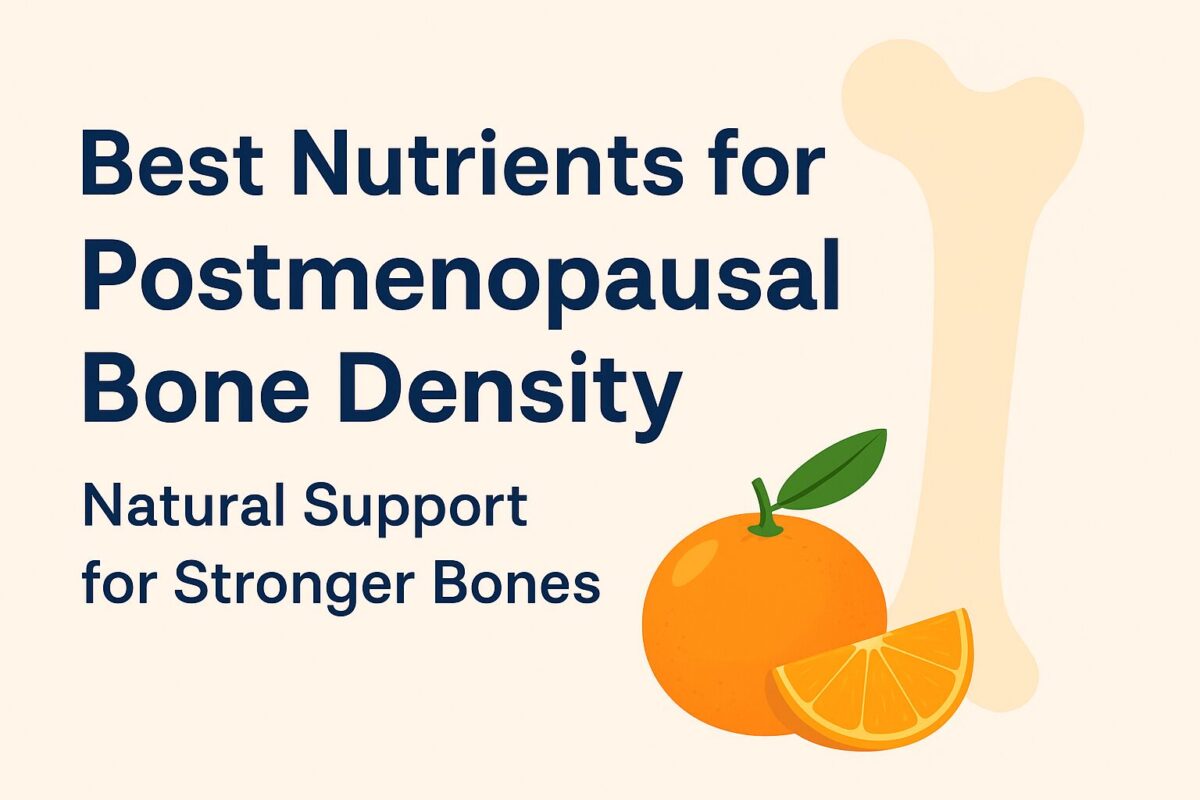Introduction
For many women, menopause brings more than just hot flashes or sleep changes—it also marks a turning point for bone health. The drop in estrogen levels after menopause accelerates bone loss, increasing the risk of osteoporosis and fractures. In fact, according to the National Osteoporosis Foundation, one in two women over 50 will experience a bone fracture related to osteoporosis in her lifetime.
The good news? The right nutrients, paired with a balanced diet and lifestyle, can help maintain and even improve bone density after menopause. This article highlights the best nutrients for postmenopausal bone density, from the well-known essentials like calcium to the emerging star beta-cryptoxanthin.
Why Postmenopausal Women Lose Bone Density
Estrogen plays a vital role in maintaining bone remodeling balance—promoting bone formation while suppressing bone breakdown. When estrogen declines during menopause, bone resorption outpaces bone formation, leading to a gradual reduction in bone density.
This process doesn’t happen overnight, but it accelerates during the first 5–10 years after menopause, making proactive bone care crucial.
Calcium: The Foundation of Strong Bones
Calcium is the most abundant mineral in bones and the building block of bone structure. Postmenopausal women are recommended to consume about 1,200 mg of calcium per day.
Best Sources of Calcium
-
Dairy products like yogurt and cheese
-
Leafy greens (kale, collard greens)
-
Fortified plant-based milks
-
Sardines and salmon with bones
However, calcium alone is not enough—it needs other nutrients for proper absorption and utilization.
Vitamin D: The Calcium Absorption Partner
Vitamin D is essential for helping the body absorb calcium from the gut and transport it into bones. Without adequate vitamin D, even high calcium intake won’t translate into stronger bones.
How to Get Vitamin D
-
Sun exposure (10–15 minutes a few times a week)
-
Fatty fish (salmon, mackerel, sardines)
-
Fortified foods (cereals, milk alternatives)
-
Supplements when sun exposure is limited
The Endocrine Society recommends maintaining vitamin D levels above 30 ng/mL for optimal bone health.
Magnesium: The Supportive Mineral
Magnesium works in synergy with calcium and vitamin D. It helps regulate bone formation and influences how calcium is deposited in bone tissue.
Food Sources of Magnesium
-
Nuts and seeds (almonds, pumpkin seeds)
-
Whole grains
-
Spinach and other leafy greens
-
Beans and lentils
Vitamin K: Directing Calcium to Bones
Vitamin K2 is particularly important because it activates proteins that bind calcium into the bone matrix, preventing calcium from being deposited in arteries instead.
Foods to contain Vitamin K richly
-
Natto (fermented soybeans, a Japanese specialty)
-
Leafy greens
-
Cheese
Protein: The Structural Component
While calcium and minerals provide the hardness of bones, protein supplies the collagen framework that makes bones resilient. Adequate protein intake also helps maintain muscle mass, which reduces fall risk—a major cause of fractures in postmenopausal women.
Omega-3 Fatty Acids: Reducing Inflammation
Chronic inflammation contributes to bone loss. Omega-3s, found in fatty fish, flaxseeds, and walnuts, have been shown to reduce inflammatory processes that damage bone tissue.
Beta-Cryptoxanthin: An Emerging Nutrient for Bone Health
Among carotenoids, beta-cryptoxanthin is gaining attention for its unique role in bone metabolism. This carotenoid, found in Satsuma mandarins, papaya, and persimmons, not only acts as an antioxidant but also stimulates bone formation and reduces bone breakdown.
Why It Matters for Postmenopausal Women
Several studies suggest that women with higher intakes of beta-cryptoxanthin have stronger bones and a lower risk of fractures. Unlike some carotenoids, it directly influences bone cell activity, making it a promising nutrient for postmenopausal bone density support.
Juveriente Bone Strength Complex: A Natural Way to Support Bone Density
While a healthy diet is the foundation of bone health, reaching optimal nutrient intake every day can be difficult—especially for lesser-known nutrients like beta-cryptoxanthin.
That’s where Juveriente Bone Strength Complex comes in. This supplement combines:
-
Satsuma Mandarin Extract, a natural source of beta-cryptoxanthin
-
Other supportive nutrients for bone strength
Designed with inspiration from Japanese dietary habits, it helps women over 50 maintain bone density naturally, without relying solely on calcium or synthetic alternatives.
Conclusion
Maintaining bone density after menopause requires a multi-nutrient approach. Calcium and vitamin D are the cornerstones, but other nutrients—magnesium, vitamin K, protein, omega-3s, and beta-cryptoxanthin—are just as vital for a comprehensive bone health strategy.
By combining a nutrient-rich diet with targeted support like Juveriente Bone Strength Complex, postmenopausal women can protect their bones, reduce fracture risk, and stay active and independent for years to come.








